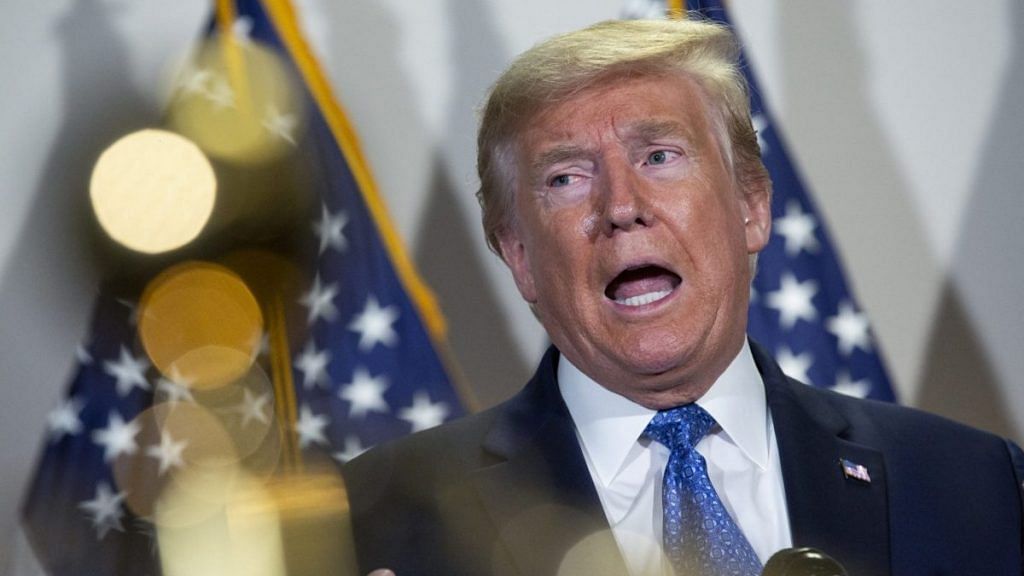New Delhi: US President Donald Trump’s offer to mediate and arbitrate between India and China — even as tensions seemed to de-escalate between the two nations Wednesday — is like the theatre of absurd playing out in a very serious situation.
ThePrint’s Editor-in-Chief Shekhar Gupta in episode 481 of Cut The Clutter said that President Trump wading in to offer his help is nothing but an example of ‘begaani shaadi mein abdullah deewana’.
Trump tweeted Wednesday: “We have informed both India and China that the United States is ready, willing and able to mediate or arbitrate their now raging border dispute. Thank you!”
We have informed both India and China that the United States is ready, willing and able to mediate or arbitrate their now raging border dispute. Thank you!
— Donald J. Trump (@realDonaldTrump) May 27, 2020
This came even as China’s foreign ministry spokesperson Zhao Lijian issued a statement the same day that the border situation with India was “overall stable and controllable”.
“Between the two countries, we have good border related mechanism and communication channels. We are capable of resolving the issues properly though dialogue and consultation,” Lijian had said.
Tensions between India and China have been running high for the past few weeks along the Line of Actual Control in eastern Ladakh, where the two armies are currently engaged in a stand-off.
Also read: After Pakistan, Donald Trump is now willing to ‘mediate’ between India and China
Why Trump’s offer does not make sense
There are a couple of reasons why Trump’s offer to mediate does not entirely make sense.
One, he has barely 165 days left for his own elections, and nobody in the US trusts him institutionally, said Gupta.
Second, India is the US’ natural strategic ally, so instead of offering to mediate, Trump should be reflecting the words of his own senior state department official, Alice G. Wells, who criticised China for trying to change status quo.
Wells, the senior US diplomat for South and Central Asia, had described Beijing’s aggression as “not always rhetorical” and accused it of continuing with its “provocative and disturbing behaviour” against India to try to shift the status quo.
Finally, there is no need for him to be speaking on this matter, but then again — begaani shaadi mein abdullah deewana. There’s a wedding going on, and people are dancing, so Donald Trump also has to come and do his own thing in the middle, according to Gupta.
Also read: How India and China resolved three major stand-offs in the Modi era
Border dispute a legacy of Nehru’s reign
India-China border standoffs have been festering for a long time, historically.
As India remembers former prime minister Jawaharlal Nehru on his death anniversary (27 May), it is also important to remember that the border dispute with China is a legacy of his reign.
In 1960, then Chinese premier Zhou Enlai tried to offer a package deal to Nehru, on his visit to India, according to a report in The Hindu.
“While Zhou didn’t formally declare that China would accept the deal where India would recognise Chinese claims on Aksai Chin (in Ladakh) and China would give up its claims on the eastern sector, he made it clear that Beijing was willing to negotiate,” states the report. That’s as close as you can come to an agreement.
Since the deal wasn’t accepted by Nehru, the visit proved to be quite acrimonious for Zhou, because by this time the Chinese had started to get disillusioned with India on ideological grounds as well.
The fact is that Zhou went back angry and thought that India did not want peace. Today, many people who’ve been watching India-China tensions play out, think that it was the best opportunity for peace that Nehru lost.
So now, whenever history assesses him, his dealings with China will be held against him.
It is true that Nehru often found himself overruled by others in his cabinet. His fans argue he was too much of a democrat. His adversaries, on the other hand, call him indecisive and bull-headed. Some would say he didn’t want to ruffle anyone’s feathers.
Whether he was a hawk or a dove, woolly-headed or bullheaded, or too much of a democrat, all these debates will continue, said Gupta.
Watch the full episode of CTC here:
